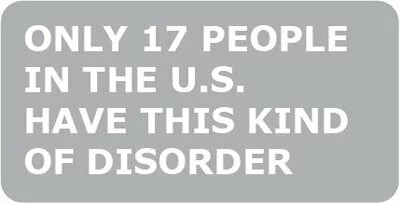

What is CIPA?
CIPA is the acronym for Congenital Insensitivity to Pain with Anhidrosis. CIPA belongs to the family of Hereditary Sensory and Autonomic Neuropathies (HSAN). Another name for CIPA is HSAN IV. Individuals affected with CIPA have impaired autonomic, sensory and motor functions.
Anhidrosis, the inability to sweat, predisposes affected individuals to high fevers.
Insensitivity to superficial and deep pain results in mutilation (e.g., of tongue and cheek), neuropathic joints, risk of unrecognized injury (burns, fractures), and corneal ulceration. Inheritence is autosomal recessive meaning an affected individual must receive two copies of the mutated gene, one from each parent. No cure for this disorder exists.

Difficulties
Individuals with CIPA lack the ability to feel pain, sweat, regulate their own body temperature and are hyperactive. They dont fear things that hurt. They are fearless.
The insensitivity to pain leads to an overuse of the bones and joints, resulting in frequent fractures and dislocations. Individuals must be monitored very closely for brusing and swelling. If injury is suspected it must be thoroughly investigated.
The inability to sweat puts individuals at high risk of heat stroke which can result in brain damage and death. The body generates heat just by moving around. Typical people expel this heat by sweating. When CIPA individuals do daily activities their body temperature elevates because the heat has nowhere to go. These individuals must be maintained at a constant temperature usually between 68-72 degrees and kept out of direct sunlight. In addition the lack of sweating makes the skin become thick and leathery putting the individual at risk for frequent skin infections or cellulitis.
Eating for affected individuals is a huge difficulty. Most never feel hunger pain, thus they never know when their body is telling them to eat. Most will mutilate their own mouths to the point that their teeth will have to be pulled and all taste buds on their tongues will be destroyed. This limits individuals to what they are able to eat due to lack of teeth to chew with. Eating for individuals affected with CIPA is a learned behavior since they dont feel hungry and they dont taste the food. Many individuals will have feeding tubes placed to maintain nutrition. Hyperactivity also plays a role in eating. CIPA individuals must learn to sit still long enough to get the learned behavior that you have to eat to survive this is a life long struggle even with medication.
Toileting is a huge issue with these children. Most have decreased gastrointestional motility, which causes frequent constipation. Toilet training is based on a timing system rather than sensation. Individuals are encouraged to toilet every two hours. There are no guarantees that there will not be accidents in between toileting episodes.
Individuals with CIPA lack the ability to detect what is hot or cold. These individuals will never be able to set their own bath water, water for washing dishes, or tell when cooked food is too hot to eat. They dont know when they need to wear a winter coat or when to wear shorts outside.
Roberto's Case
At the age of 3 months old (He weighed 12 pounds) Roberto refused to eat, he would sleep 23 out of 24 hours a day and he never cried. He was diagnosed with Failure to Thrive.
When he was 8 months old he weighted 12 pounds and the physicans after much prodding by his mother placed a feeding tube. At the same time they did oral surgery and removed multiple teeth. Roberto began to gain weight well. He had difficulty focusing on anything for more than a split second. At the age of 11 months he was hospitalized for heat stroke, his core body temperature was 108.
Over the next year and a half there were multiple hospitalizations for infections is joints and his mouth. At the age of 2 ½ he was hospitalized with a broken foot that he walked on for days before we knew anything was wrong. This finally led us to New York University where Roberto was diagnosed with CIPA. Was this a relief (finally after 2 ½ years a diagnosis) or was it your worst nightmare?
At least now we knew what we were up against and it was nice hearing it from people who had experience. No one prior to this time ever mentioned that Roberto might he hyperactive, yet at NYU they stated that he was the most hyperactive child with CIPA that they had ever seen.
Roberto is now 5 ½ years old. His baby teeth are all gone. Several of his permanent teeth have been removed, 4 teeth remain but they serve no function when it comes to chewing. His hands are wrapped most of the time to prevent him from chewing on them. He continues to mutilate his tongue and has lost the entire front left section. Eating is one of his least favorite activities.
He takes multiple medications for hyperactivity and behavior and medication to help with sleep. He still has his feeding tube, which all medications are given thru. When Robertos body temperature starts to elevate he becomes very fussy and doesnt understand what is happening to his body. We must act quickly to administer both tylenol and motrin thru the feeding tube to aid the body in cooling down.
Robertos dark eyes and big smiles bring joy to everyone he meets. Our hope is that people will aquire a whole new appreciation for pain after hearing about his diagnosis and realize that pain is a very important part of their life.



photography by The Loft Photo

